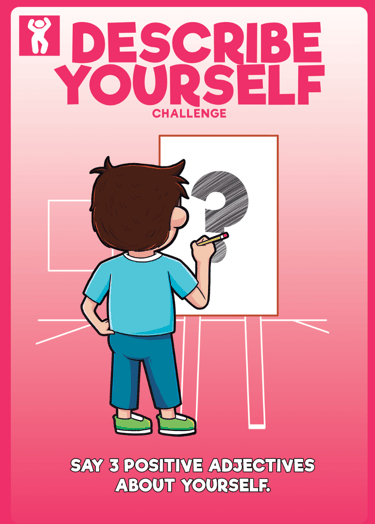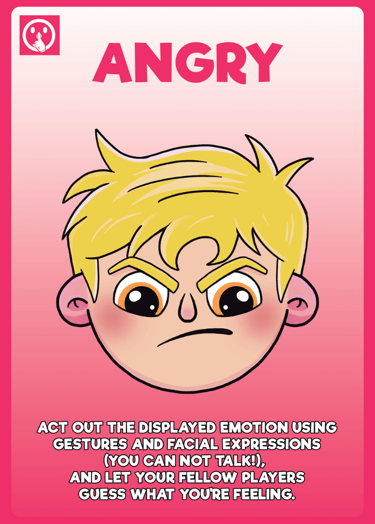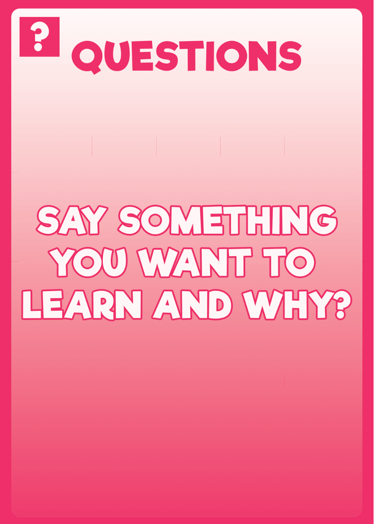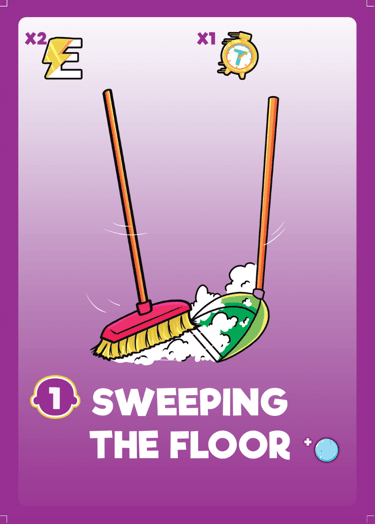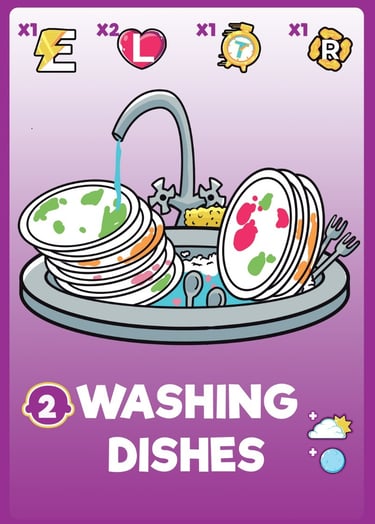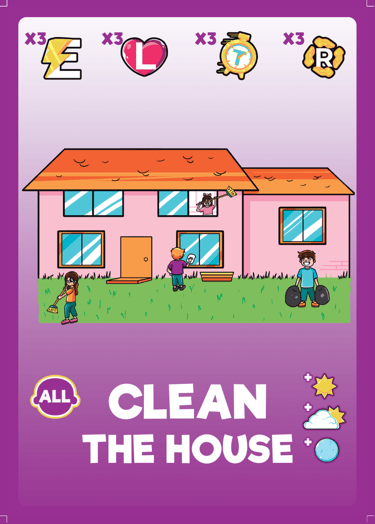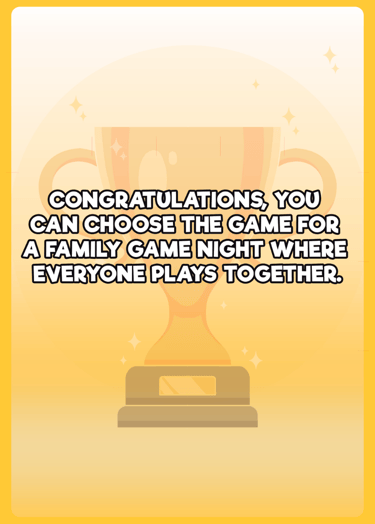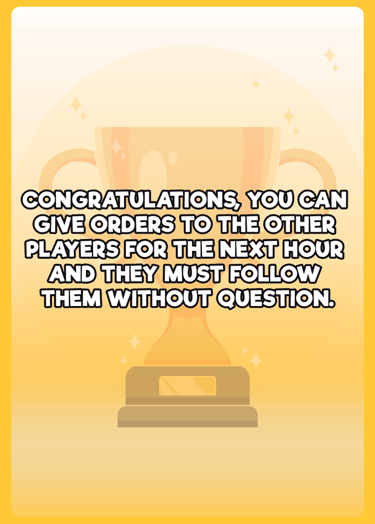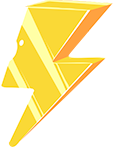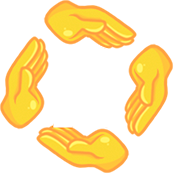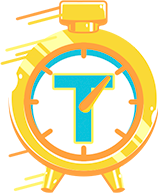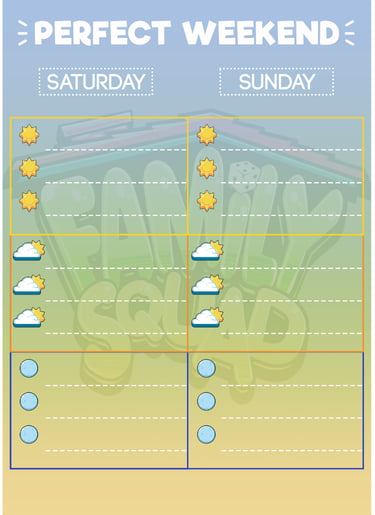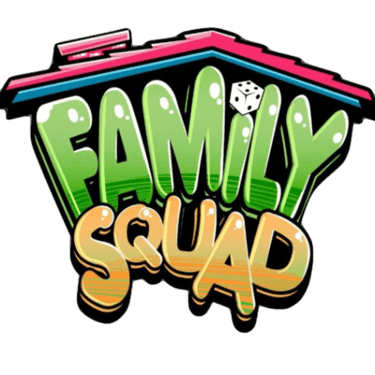The Science Behind Family Squad
Discover the science behind Family Squad, the family board game designed to build emotional intelligence, responsibility, and soft skills. Learn how board games for family night can turn play into fun family games that teach kids empathy, teamwork, and connection.
5 min read
The Science Behind Family Squad: More Than Just a Game
Family Squad may look like just another game when you first see it.
But every part of it carries a deeper meaning. A universe where every card,
every game mechanic, every interaction has a purpose.
Because this is not just about playing. It is about connecting.
It is about teaching soft skills.
It is about building a stronger family.
All while having fun.
And when you understand the why behind it, you see that Family Squad is more than entertainment.
It is one of those rare board games for family night that combines fun with emotional growth.
Why Play Matters in Families
Children learn best through play. Psychologists from Piaget to Vygotsky showed that play builds problem-solving,
communication, and emotional regulation. But play does not just benefit children.
Shared play between parents and kids creates co-regulation, stronger bonds, and family resilience.
That is why family board games have always been part of childhood. They bring everyone together around the table.
Family Squad was born from this truth, but with one important twist.
It is designed not only to entertain but also to build emotional intelligence and soft skills while you play.
Pink Cards: The Language of Emotions and Connection
The Pink Cards are the heartbeat of Family Squad. Some are questions, some are emotions, some are challenges.
At first, the cards feel like small prompts. But each one was carefully designed to guide your family through
an emotional journey of connection.
When your child recognises and acts out a feeling, they are practising emotional literacy in the most natural way, through play.
When you share a story, you are modelling vulnerability.
When the rest of the family listens, they are practising active listening.
When you take on a silly challenge together, you are building joy and trust.
Psychologists call this co-regulation, the process of managing emotions together.
Through the Pink Cards, your family develops skills in listening, empathy, and curiosity.
These are not small things. They are the foundation of emotional intelligence.
Purple Cards: Responsibility Turned Into Play
Every parent knows the struggle of chores. Reminding, nagging, repeating.
The Purple Cards flip this on its head. They transform responsibility into teamwork.
When your child draws a Purple Card, they are not just doing a chore. They are learning responsibility.
They are practising accountability in a safe and fun way. And they are also learning how to manage
and administer resources in ways that support the whole family.
From a psychology perspective, this builds resilience and self-worth. Your child begins to see themselves as capable.
You see chores shift from conflict to collaboration. Responsibility becomes a game, and the lesson sticks.
Golden Cards: The Science of Motivation
Rewards matter. Behavioural psychology shows us that positive reinforcement strengthens desired behaviours.
But in Family Squad, Golden Cards are not just prizes. They are recognition.
A Golden Card says: you did something great, we noticed, and we celebrate together.
That spark of joy fuels motivation.
It teaches kids that effort leads to rewards.
And when rewards are shared in a family context, they also build appreciation.
The message becomes: we lift each other up.
Family Pillars: The Resources We All Manage
Time. Energy. Love. Responsibility.
Every family manages these resources, whether consciously or not.
Family Squad turns them into something visible, tangible, and playful. The Family Pillars are more than tokens.
They are metaphors for real life.
When your child decides how to spend “Energy” or “Time” in the game,
They are practising decision-making.
When you search together for the best way to combine resources,
you are learning how to optimise by finding the best solutions as a team.
When you see that too much focus on one pillar weakens another,
you are learning systems thinking, a skill that will serve your child for life.
In psychology, this touches on executive function, self-regulation, and cooperation.
But in Family Squad, it feels like fun.
The Perfect Weekend: Planning, Dreaming, Building Together
Every family has a dream weekend. Maybe it is a picnic, a bike ride, or just pancakes and laughter in the kitchen.
The Perfect Weekend feature of Family Squad captures this simple but powerful idea.
When you build your Perfect Weekend in the game, you are not just making a plan.
You are practicing collaboration. You are learning to dream together and to make choices that align with what matters most.
And there is something even deeper. Your kids begin to see that when they help with chores in real life, you have more free time and more energy to share. That is when the family can enjoy weekends, games, or moments together. The Perfect Weekend is not just a fantasy. It is the real-life reward of teamwork at home.
This is executive function in action, planning, sequencing, and teamwork. But it is also love in action.
You see that happiness is not bought, it is built together.
The Universe of Family Squad
Each mechanic, Pink, Purple, Golden, Family Pillars, Perfect Weekend, stands on its own.
But together they form a universe. A universe where connection, responsibility, motivation, balance,
and dreaming are all part of the same story.
It is not random. It is intentional.
Because families do not grow in fragments, they grow as a whole.
When you sit down to play Family Squad with your kids, you are not just entertaining them.
You are giving them tools for life. You are strengthening bonds, teaching skills, and creating memories.
Why This Matters
In a world full of screens and distractions, families need simple rituals that pull them back to each other.
Families need ways of learning by doing.
Families need fun family games that spark laughter, hugs, and presence.
Families need board games for family night that go beyond passing the time and instead create emotional growth.
Family Squad was created to be that ritual. A simple game, but one with roots in psychology, emotional intelligence, and love.
Because connection is not something that just happens. It is something you build. One card, one choice, one laugh at a time.
👉 Play Family Squad – How to Use Family Squad as a Powerful Tool for Connection
